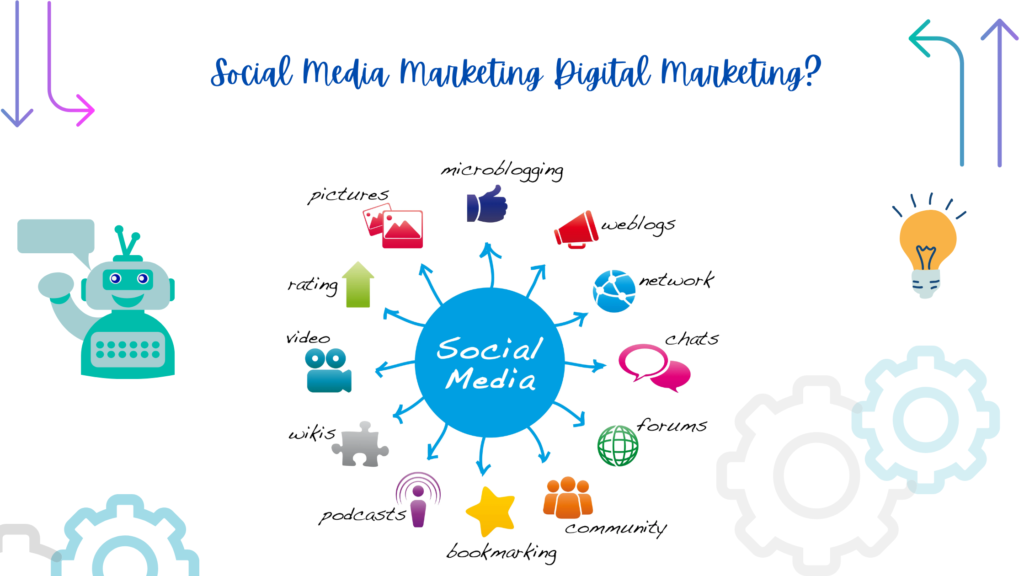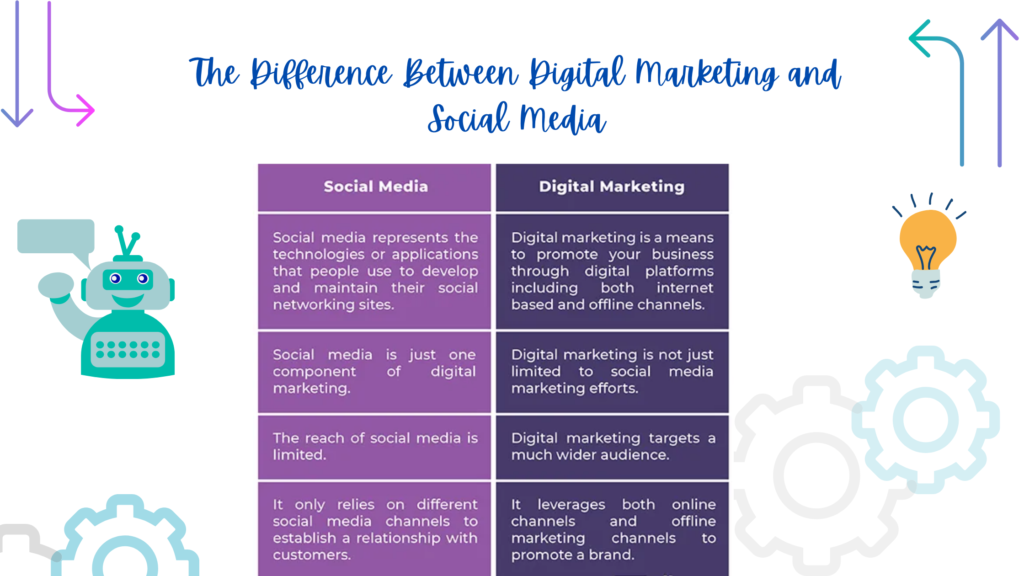Is Social Media Marketing Different from Digital Marketing?

Social media marketing and digital marketing are terms that are often used interchangeably, but they are not exactly the same. While social media marketing is a part of digital marketing, digital marketing encompasses a broader range of online marketing strategies and techniques. In this blog post, we’ll explore the differences between social media marketing and digital marketing, and why understanding these distinctions is crucial for businesses aiming to succeed in the digital landscape.
What is Social Media Marketing?
Social media marketing refers to the process of promoting products, services, or brands through various social media platforms such as Facebook, Instagram, Twitter, LinkedIn, and others. It involves creating and sharing engaging content, engaging with the target audience, building brand awareness, and driving conversions through these social channels.
The primary objective of social media marketing
The primary objective of social media marketing is to build a strong online presence, establish a community around the brand, and foster meaningful connections with potential and existing customers. It allows businesses to interact directly with their audience, gather valuable insights, and leverage the power of word-of-mouth marketing.
Strategies employed in social media marketing include:
Content creation and curation: Developing and sharing relevant, valuable, and engaging content (e.g., text, images, videos, live streams) that resonates with the target audience.
Community management: Actively engaging with followers, responding to comments and messages, and fostering a sense of community around the brand.
Influencer marketing: Collaborating with influential individuals or brands within the relevant industry or niche to promote products or services.
Social media advertising: Utilizing paid advertising options provided by social media platforms to reach a wider audience and achieve specific marketing objectives.
Social media analytics: Monitoring and analyzing metrics such as engagement rates, follower growth, click-through rates, and conversions to measure the effectiveness of social media campaigns.
What is Digital Marketing?
Digital marketing is a broader term that encompasses all marketing efforts that utilize digital channels and technologies to promote products, services, or brands. It involves various online marketing strategies and tactics designed to reach and engage with target audiences across multiple digital platforms.
Digital marketing encompasses a wide range of activities, including:
Search Engine Optimization (SEO): Optimizing websites and content to rank higher in search engine results pages (SERPs) for relevant keywords.
Pay-Per-Click (PPC) Advertising: Running paid advertising campaigns on search engines (e.g., Google Ads) and other platforms to drive targeted traffic to websites.
Content Marketing: Creating and distributing valuable, relevant, and consistent content (e.g., blog posts, videos, podcasts) to attract and retain a clearly defined audience.
Email Marketing: Sending promotional messages, newsletters, or targeted campaigns directly to subscribers’ inboxes.
Affiliate Marketing: Promoting products or services by partnering with publishers or influencers who earn a commission for every sale or lead generated.
Mobile Marketing: Reaching and engaging with audiences through mobile devices, apps, and location-based services.
Social Media Marketing: As discussed earlier, promoting and engaging with audiences on social media platforms.
Difference between Social Media Marketing and Digital Marketing
While social media marketing falls under the umbrella of digital marketing, there are several key differences between the two:
1. Scope:
Digital marketing encompasses a broader range of online marketing strategies and channels, including search engine optimization, pay-per-click advertising, content marketing, email marketing, and social media marketing. Social media marketing, on the other hand, is primarily focused on leveraging social media platforms for marketing purposes.
2. Objectives:
The primary objective of social media marketing is to build brand awareness, foster community engagement, and drive conversions through social channels. Digital marketing, however, aims to achieve a diverse set of objectives, such as increasing website traffic, generating leads, improving search engine rankings, and driving sales through various digital channels.
3. Audience targeting:
Social media marketing allows businesses to target specific audiences based on demographics, interests, behaviors, and location data provided by social media platforms. Digital marketing employs a variety of targeting methods, including keyword targeting, contextual targeting, remarketing, and more, across multiple digital channels.
4. Content and messaging:
Social media marketing often involves creating and sharing content that is more informal, visual, and engaging to resonate with the social media audience. Digital marketing content can vary widely, from informative blog posts and whitepapers to product descriptions and landing page copy, depending on the channel and campaign objectives.
5. Analytics and measurement:
While both social media marketing and digital marketing rely on data and analytics to measure success, the metrics and tools used can differ. Social media analytics focus on engagement rates, follower growth, and social referral traffic, while digital marketing analytics may include website traffic, conversion rates, return on investment (ROI), and search engine rankings.
6. Integration and synergy:
While social media marketing can be effective on its own, it often works best when integrated with other digital marketing efforts. For example, social media can drive traffic to a website optimized for search engines, or social media ads can complement and reinforce other digital advertising campaigns.
The Importance of Understanding the Difference
Recognizing the distinctions between social media marketing and digital marketing is crucial for businesses to develop and implement effective marketing strategies. By understanding these differences, businesses can:
1. Allocate resources effectively:
Identify the appropriate channels and tactics to invest in based on their specific marketing goals and target audience.
2. Develop tailored strategies:
Craft targeted strategies for each digital marketing channel, including social media, to maximize their impact and effectiveness.
3. Measure success accurately:
Choose the right metrics and analytics tools to accurately measure the success of their social media marketing efforts and broader digital marketing campaigns.
4. Foster collaboration:
Facilitate better collaboration and integration between teams or individuals responsible for different digital marketing channels, ensuring a cohesive and consistent brand experience.
5. Stay ahead of the curve:
Stay informed about the latest trends, best practices, and emerging technologies within both social media marketing and the broader digital marketing landscape.
Conclusion
While social media marketing and digital marketing are closely related, they are not interchangeable terms. Social media marketing is a crucial component of digital marketing, but digital marketing encompasses a broader range of online marketing strategies and channels.
Understanding the differences between social media marketing and digital marketing is essential for businesses to develop and implement effective marketing strategies, allocate resources appropriately, measure success accurately, foster collaboration, and stay ahead of the curve in the rapidly evolving digital landscape.
By recognizing the distinct objectives, audience targeting methods, content requirements, and analytics for each, businesses can leverage the power of both social media marketing and digital marketing to achieve their marketing goals and build a strong online presence.


